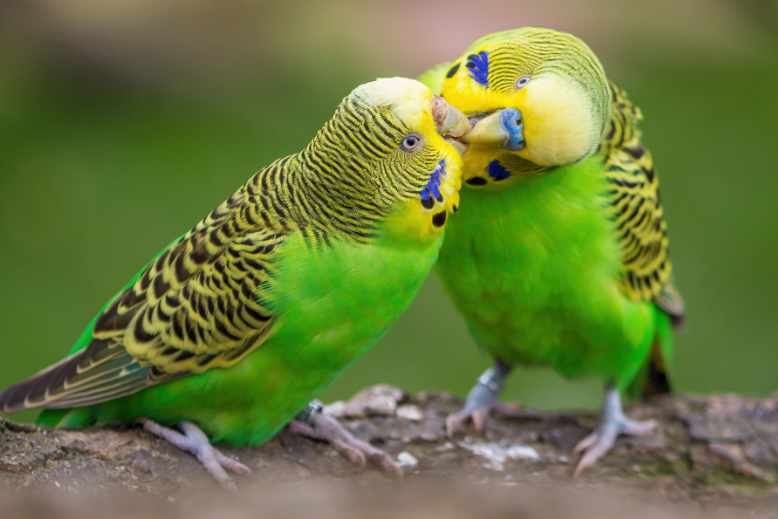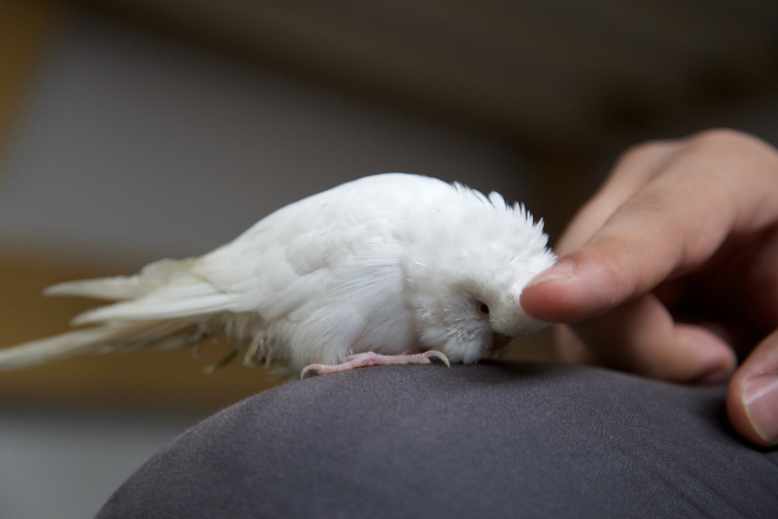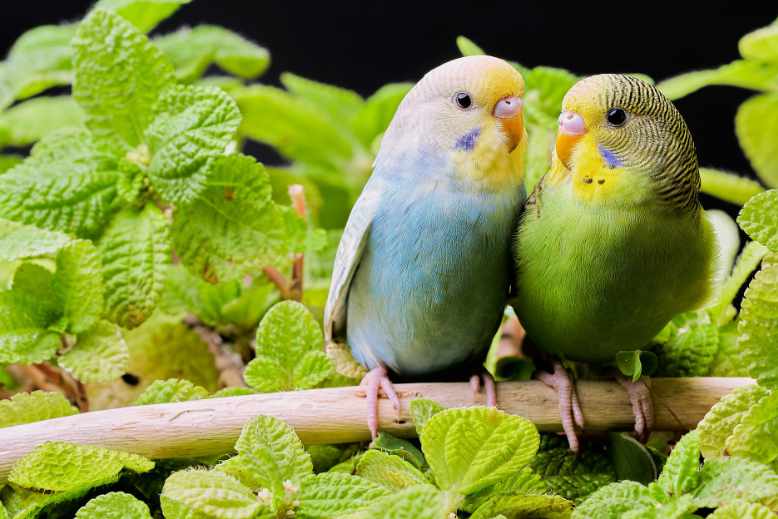How do budgies sleep? Budgies sleeping positions vary depending on different factors, but most budgies sleep by perching on one leg. They grab a small branch with one of their legs, raise the other foot to their fluffy chest, turn their heads to rest them on the shoulders, and close their eyes. Occasionally male budgies sleep with their females inside a nest.
While to most aviphiles, it may not seem like the most suitable sleeping position, budgies have evolved different sleeping arrangements to suit their surroundings. They may choose from an array of strange postures to nap.
As a concerned budgie owner, it’s critical to verify what your budgie’s sleeping positions indicate to help the pet get the best night’s sleep. With that thought in mind, today we will discuss budgies sleeping positions along with the things you need to know about your vibrant pet’s sleeping nature. We will also look for the factors affecting a budgie’s sleep and how much sleep do budgies need.

Budgies sleeping positions: how do budgies sleep?
Budgies sleep by resting on the highest branch of a tree. They grip onto the tree branch with their strong feet and rest without falling down.
Usually, wild budgies sleep in large flocks, occupying tall trees near a water source. They select the highest branches to escape predators lurking on the ground at night.
While settling down for the night, budgies lower their bodies on the tree branch and draw their tiny feet closer to their chest. This posture keeps their featherless legs warm and prevents body heat loss. Budgies also like to rotate their flexible necks to tuck their heads into their wings. They do this to rest their neck muscles. However, parakeets only rest their heads on their backs if they feel safe; otherwise, they sleep with their head upright.
It isn’t rare to see budgies sleeping in pairs in a nest. They do this to seek extra protection or to escape the cold in freezing atmospheres. This behavior is usually expected in wild budgies who aren’t breeding. Once the female budgie starts laying eggs, the male has to quit sleeping in the nest.
Captive budgies also exhibit the same sleeping behavior.
If you have several budgies in your budgie cage, your birds are likely to group together and look for the highest position to sleep in. However, if your coop doesn’t have a perch, these colorful pets may rest on a toy, a feed container, or a swing.
You may notice your budgies sleeping in weird positions like hanging upside down. This is quite normal, and you don’t have to worry about it.
Budgies usually close their eyes and rest their heads on their back when they feel safe. Don’t get worried if your pet doesn’t do this. The little birdie may need some time to get comfortable with his new environment, or perhaps your parakeet simply likes to sleep with his heads up. Remember, budgies are like humans; each one has its own unique personality and preferences.

Common budgie sleeping positions
Most people assume that budgies sleep in one fixed and relaxed position. However, that’s definitely not the case. Budgies are known for sleeping in all sorts of weird poses. You may get worried by noticing your beloved pet sleeping in an unsuitable place, like sleeping while clinging to the bars or sleeping over the toys, but that’s normal. Still, if you are unsure whether your pets are comfortable, you can always look for their sleeping guide.
Here are budgie sleeping positions with their meanings.
Sleeping while lying down
Budgies usually sleep while standing on one foot. Nevertheless, this doesn’t mean other sleeping positions are a cause for concern. Some budgies like to lie on their bellies while others sleep on the cage floor. If you find your budgie sleeping like this, the possible reasons could be:
- Lack of space
These sleeping angles are common when multiple budgies live in a small cage, and the space is a little tight. Your budgie may choose this position if there is no space left on the community perch.
- Feeling tired
Your beloved pet may take up this sleeping posture if he is feeling tired or feeble. This angle helps the birdie to rest his legs and catch a breath. It isn’t something to be concerned about as long as it doesn’t last for several days. Your pet should recoup his energy and rest somewhere high in short order.

- Illness
If your bird doesn’t straighten up for many days, he might lack the energy to grip the perch with his foot. So, if you notice any signs of illness like heavy breathing or messy feathers, take your delicate buddy to an avian vet.
Lying down on the perch
Some budgies don’t lie on the floor. Instead, they lie flat on their perch. While this looks extremely uncomfortable and even shaky to us, budgies are perfectly capable of handling this posture.
Here is why your budgie might be doing that:
- Extra tired
The little birdie may be using this posture to rest his legs. He will do this for one or two days before returning to his previous sleeping position.
- Extra cold
If you live in a freezing environment, the budgie will try to keep himself warmer. He will tuck up into a fluffy ball and will lean down to preserve heat. To help your pet sleep well, you can place a warm blanket around your parakeet cage setup. Owners can also turn on a heater in the room for maximum comfort.
- Potential illness
Does your budgie sleep while lying down on a perch most nights? If so, it could be a sign of an underlying health concern. Your pet may be incapable of gathering the energy to sleep upright. Thereby, if you notice any other concerning symptoms or if this sleep pattern continues for many days, consult your vet.
Sleeping on one leg
For these beautiful birds, resting on one leg is the most comfortable position. Though it appears strenuous to us, it’s an excellent way to:
- Conserve warmth
Tucking one leg in the feathers allows a bird to warm up the lambs. It also keeps the heat from escaping through the thin skin of the legs.
- Conserve energy
By sleeping on one leg, budgies give rest to the other one.
- Stay cozy
Budgies feel safe with one leg pulled up.
These birdies sleep like this when they feel relaxed and comfortable. You may also find your pet rotating from one leg to another, ensuring that both legs are warm and well-rested.
Sleeping on the side of the cage
It is pretty standard for budgies to abandon their usual sleeping positions. Though some of their sleep positions, like hanging upside down, may make you alarmed, the good news is there is nothing to be bothered about. Budgies are parrots, and like all other parrots, they also like hanging at different angles.
Budgies sleep in weird positions because:
- Higher vantage point
Wild budgies prefer sleeping on the loftiest branches because:
- It allows them to avoid ground predators
- It is easier for them to flee out of it
Parakeets, therefore, can find higher perches for sleeping purposes. However, if your pet can’t find a vantage point, he is likely to sleep on the side of his cage. It may be less comfortable but feels safer.
- Privacy from other birds
If you have more than two budgies, you will find that one or two of your pets are clinging side by side to the edge or roof of the cage. It is a couple’s nesting behavior. Usually, when paired, male and female budgies start sleeping in different locations than the rest of their group. It’s entirely normal behavior, and there is no cause for concern.

- The pet dislikes other sleeping spots.
Does your birdie like sleeping in strange and uncomfortable positions? Then it may dislike other sleeping spots available.
Perhaps the perch haven’t been cleaned in a while, or maybe the other spots are too close to something they would like to avoid, such as a source of loud noise or a cat.
Sleeping with head down
Budgies usually sleep with their heads resting on their back. But it is also natural for these birds to sleep with their heads down.
- Conserving warmth
Most parrots sleep this way during the chilly months of the year. It allows them to keep their eyes, cheeks, head, and beak warm by nestling those parts under a thick layer of feathers.
- Safe and comfortable
Parrots don’t shield their face if they are scared. Even merely anxious budgies like to stay alert, to the point of sleeping with only one eye closed. So, if your pet is tucking his head down, he is comfortable in your home.
- Feeling sick
If your budgie often sleeps this way and cleans itself less, it might feel unwell. Pay close attention if your bird acts lethargic and if its feathers become tattered.
How long do parakeets sleep?
Parakeets usually sleep for 10 to 12 hours a day. Most of their sleeping is done at night, but they also take naps throughout the day.
In the wild, budgies usually sleep when the sunsets. They rise at dawn and forage for food and water. Captive budgies also retain their natural instant and sleep using the sun cycle.
Budgie owners who keep their feathery friends inside need to know that artificial lighting can affect their pet’s sleeping patterns. While you may enjoy staying up late, it can be unhealthy for your budgie.
If your budgies don’t get enough sleep, they will be cranky, irritated, and aggressive. It can cause your pets to lash out at each other and can even lead to minor injuries. Sleeping the whole day could be a symptom of insufficient sleep at night.
How to help your budgie sleep better
Here are some ways that can help your pet get a good night’s sleep.
- Provide some good sleeping perches.
Budgies like to sleep on high perches. Therefore, provide your budgie with at least one perch in the cage.
If you have multiple budgies, make sure that there is space for all the birdies to sit on the perch. Not having enough space can make your budgies fight over the best perching positions.
- Cover your bird’s cage at night
Budgies like a bedtime routine that mimics the cycle of the sun. So cover your budgie cage to provide darkness if you keep your pet inside. Make sure the cover or blanket you are using blocks most of the sunlight but allows the air to get in the budgie cage.
Your budgie may get a little startled when you first start covering his cage. But don’t worry, he will quickly get used to the routine and enjoy having a dark space.
If you find your budgie can’t handle the darkness, provide a gentle night light that stimulates the moonlight.
- Turn down the noise.
Loud noises can scare your budgies at night, causing them to fly around and injure their delicate wings. So make sure wherever you are keeping your budgie, it’s hushed at night.
- Maintain an adequate room temperature
Parakeets don’t like being too hot or too cold when they are asleep. Maintain a comfortable temperature in the place where you plan on keeping your budgie.
If your pet lives outside, ensure they have a place to stay protected from cool breezes. In case there are extreme temperature changes, consider bringing your budgie inside.
Can budgies sleep with noise?
Budgies, like all other birds, chatter a lot and make several noises. Some of their sounds indicate madness, while others indicate distress. While it’s natural for a budgie to utter many sounds, and some budgies are also used to a noisy environment, most are light sleepers. Sudden loud noises can make it hard for them to sleep. So the best thing you can do is find out what type of noise bothers your friend and what you can do about it.




